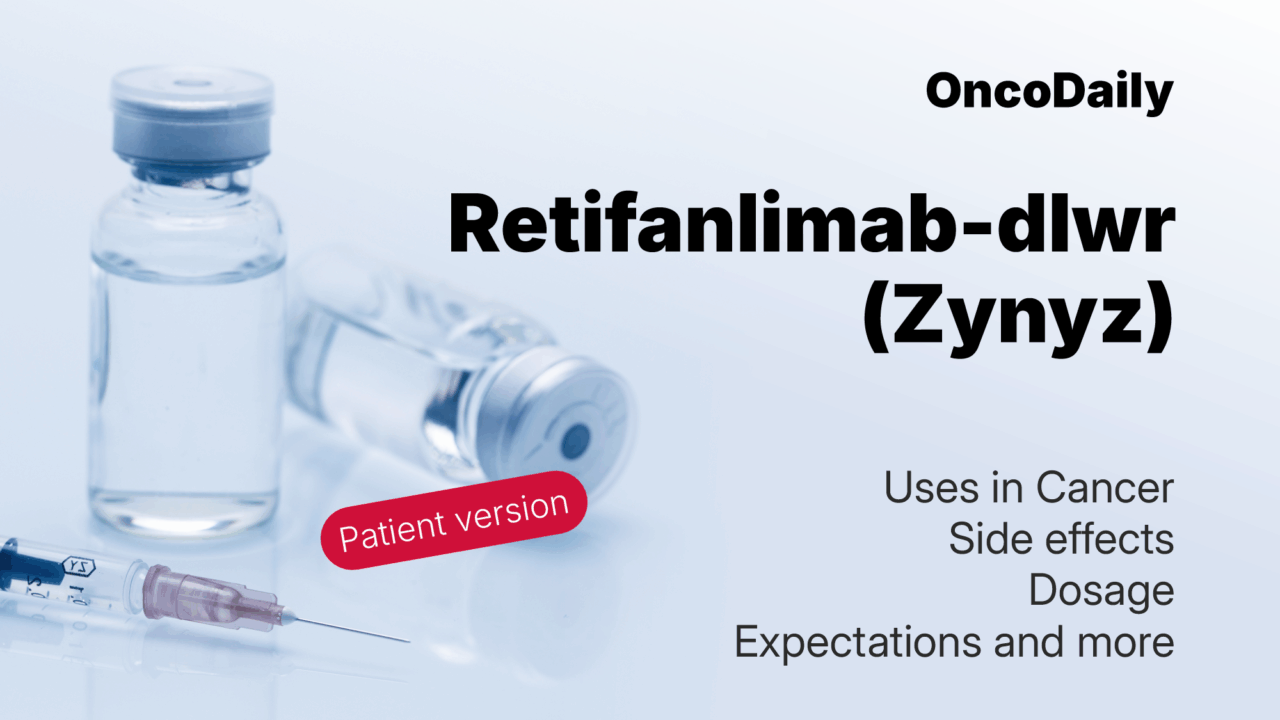Retifanlimab-dlwr is a type of immunotherapy recently approved by the U.S. Food and Drug Administration (FDA) for two rare and aggressive cancers: Merkel cell carcinoma (MCC) and advanced squamous cell carcinoma of the anal canal (SCAC). Developed by Incyte Corporation, Zynyz is part of a new wave of treatments designed to harness the power of the immune system to fight cancer more effectively. As of 2025, this medication offers renewed hope to patients with limited treatment options.
What Is Retifanlimab and How Does It Work?
Retifanlimab-dlwr, marked as a brand name Zynyz, is an immune checkpoint inhibitor, which means it helps the immune system recognize and attack cancer cells. Specifically, it is a humanized monoclonal antibody that targets PD-1, a receptor found on T cells—a type of white blood cell involved in immune defense. Normally, PD-1 binds to proteins called PD-L1 and PD-L2, which are often produced by cancer cells to “hide” from the immune system. When this happens, the immune system is less able to detect and destroy cancer.
Zynyz blocks this interaction, effectively “releasing the brakes” on the immune system. As a result, T cells can better recognize cancer as a threat and mount an immune response. This mechanism of action allows Zynyz to treat tumors that rely on immune evasion, offering a powerful therapeutic option for certain advanced cancers.
What Cancers Does Zynyz Treat?
Zynyz has been FDA-approved to treat two specific cancer types:
- Merkel Cell Carcinoma (MCC): In March 2023, Zynyz was approved for adults with metastatic or recurrent locally advanced MCC who had not received prior systemic therapy. MCC is a rare and aggressive skin cancer with few treatment options, and Zynyz is currently the only PD-1 inhibitor approved specifically for this condition.
- Squamous Cell Carcinoma of the Anal Canal (SCAC): In May 2025, Zynyz became the first immunotherapy approved for advanced anal cancer. It is used in combination with chemotherapy (carboplatin and paclitaxel) for newly diagnosed patients with inoperable, locally recurrent, or metastatic SCAC. It is also approved as a single agent for patients whose disease has progressed after platinum-based chemotherapy or who cannot tolerate it.
Efficacy and Results from Clinical Trials
The effectiveness of Retifanlimab has been demonstrated in several major clinical trials. In the POD1UM-201 study for MCC, Zynyz was tested in patients who had never received systemic treatment. The drug achieved an objective response rate (ORR) of 52%, meaning more than half of the patients saw a reduction in tumor size. Even more impressively, 18% experienced complete tumor disappearance. Most responses were long-lasting, with 76% maintaining a response for at least 6 months and 62% for at least a year.
For SCAC, the POD1UM-303/InterAACT 2 Phase 3 trial tested Zynyz in combination with chemotherapy. The study showed that patients who received Zynyz lived longer without disease progression—median progression-free survival (PFS) was 9.3 months compared to 7.4 months with chemotherapy alone. The ORR was also higher at 56% with Zynyz. In the POD1UM-202 trial for patients with SCAC who had already tried platinum chemotherapy, Zynyz alone had a 14% response rate with a median duration of response of 9.5 months.
These results highlight the meaningful benefits of Zynyz in controlling tumor growth and improving outcomes for patients with difficult-to-treat cancers.
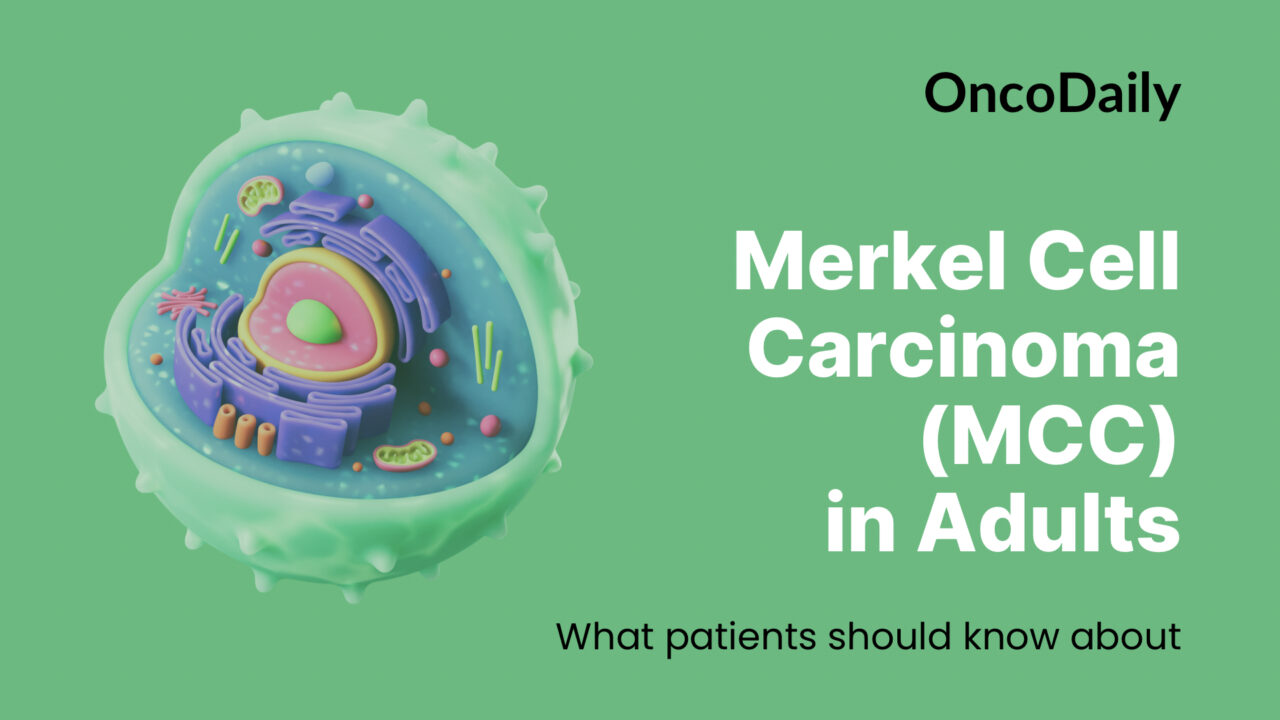
You can read more about Merkel Cell Carcinoma (MCC) in Adults: What patients should know on OncoDaily.
What Is a Clinical Trial and Why Does It Matter?
A clinical trial is a research study designed to test new drugs and treatments in patients to determine their safety and effectiveness. Before Retifanlimab was approved, it went through multiple phases of clinical trials to assess how well it worked, what side effects it caused, and whether it was better than existing treatments. Clinical trials are essential because they provide scientific evidence that a drug can help patients while ensuring it is safe for widespread use.
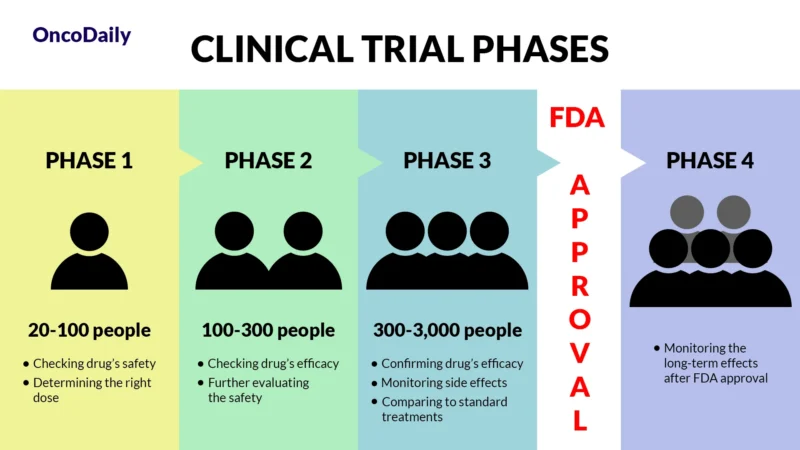
What Does FDA Approval Mean?
When a drug receives FDA approval, it means that after rigorous testing in clinical trials, it has been shown to be both safe and effective for treating a specific condition. This approval makes the drug widely available for doctors to prescribe and helps patients access new, cutting-edge treatments sooner.
Retifanlimab-dlwr Side Effects and Management
Like other immunotherapy drugs, Zynyz can cause side effects by activating the immune system. While many side effects are mild and manageable, some can be more serious. Knowing what to expect helps patients stay informed and seek help early when needed.
Common Side Effects
Most patients experience mild side effects such as fatigue, muscle or joint pain, itching, skin rash, diarrhea, fever, or nausea. These usually appear within the first few weeks of treatment and often improve with rest or simple medications. If Zynyz is combined with chemotherapy, patients may also notice hair thinning, constipation, or numbness in fingers or toes.
Less Common but More Serious Side Effects
In rare cases, Zynyz can cause the immune system to attack healthy organs. This may lead to lung inflammation (causing cough or shortness of breath), colitis (causing diarrhea and stomach pain), or liver issues (such as yellowing of the skin or dark urine). Some patients may develop hormone problems, such as thyroid or adrenal gland changes, which can make you feel very tired or dizzy.
Managing Side Effects
Most side effects can be managed with medications, monitoring, and support. Serious immune-related reactions may require pausing treatment and starting steroids to reduce inflammation. If symptoms improve, Zynyz may be resumed. In life-threatening cases, the drug is stopped permanently. Your doctor will monitor your blood tests regularly to catch any issues early.
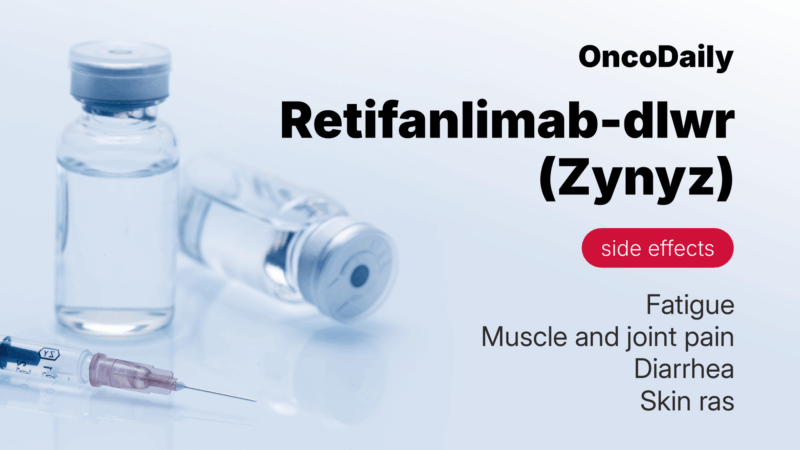
Recommended Dose of Retifanlimab
The usual dose of Zynyz for adults is 500 milligrams, given once every four weeks. This dose is the same whether the drug is used alone for Merkel cell carcinoma or in combination with chemotherapy for advanced anal cancer.
For patients with newly diagnosed, inoperable, or metastatic anal cancer, Zynyz is first given alongside carboplatin and paclitaxel chemotherapy for six treatment cycles. After this initial phase, Zynyz may be continued alone for up to one year if the patient is tolerating treatment and the cancer has not progressed. If side effects become severe or if immune-related complications develop, the dose schedule may be paused or permanently stopped based on your doctor’s judgment. However, no dose adjustment is usually needed for patients with mild liver or kidney problems.
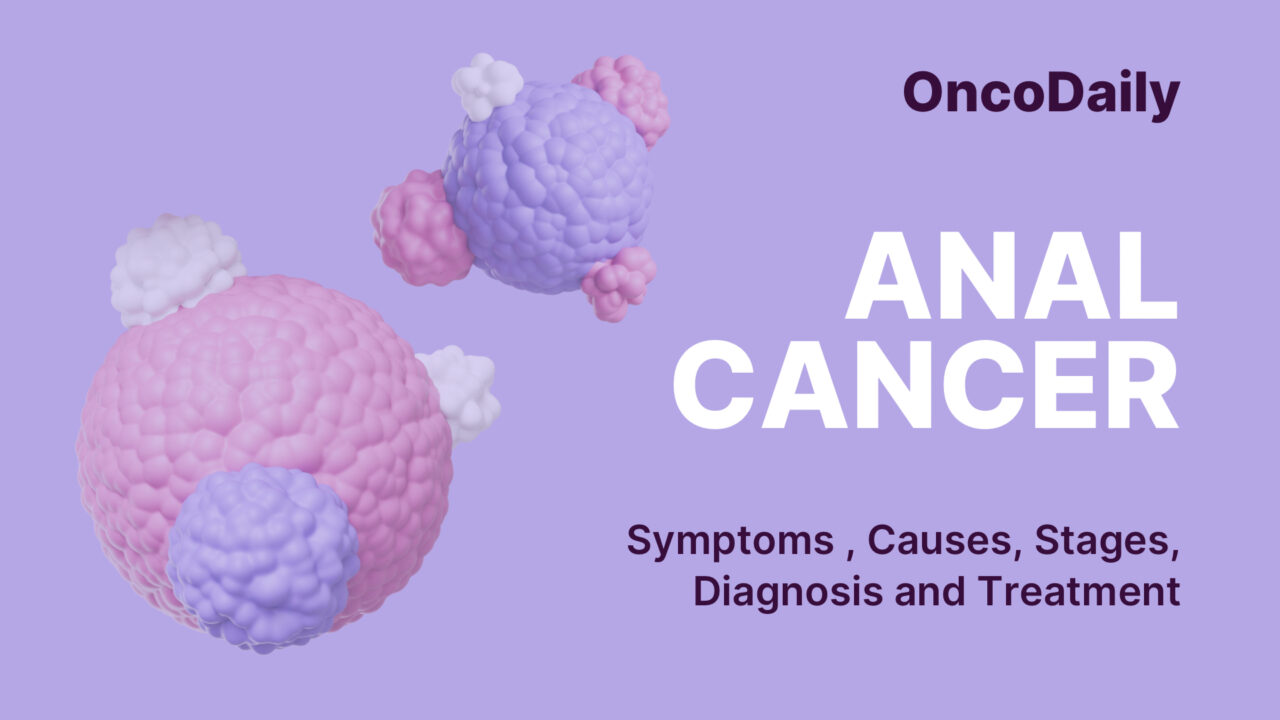
Learn more about Anal Cancer: Symptoms, Causes, Stages, Diagnosis and Treatment on OncoDaily.
How Zynyz Is Administered?
Zynyz is given as an intravenous (IV) infusion through a vein in the arm, usually at a hospital or cancer treatment center. Each infusion takes about 30 minutes and is given once every four weeks. Before administration, the medication is diluted in a sterile solution like normal saline or dextrose in water. The drug is never mixed with other medications in the same IV line and should not be given as a rapid injection. It is delivered slowly through an infusion pump using a filtered IV set to ensure safety.
Patients do not usually need to fast or take special preparation before the infusion, but premedication with antihistamines or steroids may be recommended if there is a risk of infusion reactions. After receiving Zynyz, you may be observed for a short time to check for any side effects. If the diluted drug is not used immediately, it must be stored under specific conditions and used within a safe time window to avoid degradation.
What to Expect Long-Term?
Zynyz is not considered a cure, but it can provide long-lasting tumor control in some patients. In clinical trials for MCC, many patients continued to respond for over two years, and some lived more than 45 months after starting treatment. These results are very encouraging for a cancer that typically has poor outcomes.
For SCAC, the drug has also shown durable responses and improved progression-free survival. Your individual results will depend on many factors, including the cancer type, overall health, and response to treatment. If cancer progresses during or after treatment, your care team may consider switching to another therapy or enrolling you in a clinical trial.
What Should You Avoid During Treatment?
While receiving Zynyz, it is important to avoid certain activities and substances:
- Do not receive live vaccines, as your immune system may be affected by the treatment.
- Avoid grapefruit and grapefruit juice, which can interfere with how your body processes the drug.
- Limit sun exposure, as Zynyz may increase your sensitivity to UV light.
- Avoid using the same IV line for other medications unless directed by your care team.
- Always inform your healthcare provider about all medications, supplements, or herbal products you are using.
Real-Life Effectiveness
While clinical trials offer important insights, real-world use of Zynyz is showing similar benefits. Patients with MCC and SCAC are experiencing durable responses and improved quality of life, even outside of trial settings. Ongoing monitoring and research continue to confirm its effectiveness in broader populations, including those who may have other health issues or who do not meet strict clinical trial criteria.
Looking Ahead – The Future of Treatment
Zynyz represents an exciting advance in cancer immunotherapy, particularly for rare and aggressive cancers. Researchers are now working to expand its use into more cancer types, including pancreatic and soft tissue tumors. There is also interest in combining Zynyz with other immunotherapies or targeted agents to boost its effectiveness even further.
What Other Trials Are Ongoing?
Researchers are actively studying Zynyz in combination with other therapies and for other cancer types. The PERELI study is testing Zynyz with pemigatinib, a targeted therapy, in patients with advanced dedifferentiated liposarcoma (DDLPS)—a rare soft tissue cancer. The goal is to see if the two drugs together can improve immune response and control tumor growth better than either alone.
Another study, called RiLEY, is exploring the combination of Zynyz with 9-ING-41 (a GSK-3β inhibitor) and modified FOLFIRINOX chemotherapy in patients with advanced pancreatic cancer. This trial is in its early stages, focusing on safety before moving to a larger group of patients. These studies are part of a broader effort to extend the benefits of Zynyz to more cancer types and to find effective combinations that may further improve outcomes.
If you’re a healthcare provider, access the professional version here.


